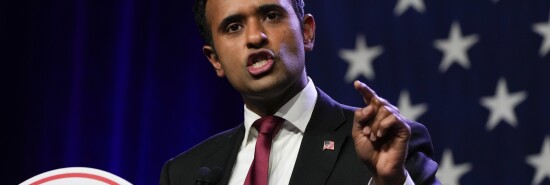
You can’t hack foreign policy
Seth Mandel
Video Embed
Presidential candidate Vivek Ramaswamy’s foreign policy fumble over China and Taiwan was roundly criticized as a single bad idea, but in fact, it shows why Ramaswamy will never be ready for prime time. The whole fuss was also an important lesson: Often, it’s an advantage to see the world of politics through the eyes of an actual politician rather than those of a fresh-faced outsider.
On Monday’s Hugh Hewitt show, Ramaswamy said, “I’m being very clear: Xi Jinping should not mess with Taiwan until we have achieved semiconductor independence, until the end of my first term when I will lead us there. And after that, our commitments to Taiwan, our commitments to be willing to go to military conflict, will change after that because that’s rationally in our self-interest.”
UP FOR DEBATE: TRUMP, DESANTIS, AND 2024 GOP HOPEFULS’ STANCES ON EDUCATION
Hewitt’s follow-up questions sent Ramaswamy running for the exits before the interview had been scheduled to end. Ramaswamy wouldn’t commit to laying down a “red line” regarding a Chinese invasion of Taiwan, probably because he hadn’t given much thought to the war part of the equation, just the semiconductors.
And that’s a larger problem than it might seem at first glance.
It is certainly, as many like to say, an advantage for a candidate to have “real-world experience,” usually referring to executive experience in the private sector. But Ramaswamy’s experience cuts in a different direction.
Ramaswamy found success in the world of hedge funds and then steadily focused on biotech investment, specifically buying pharmaceutical patents and bringing them to market. Ramaswamy’s overall track record is solid, and no one’s early failure should define their life and career — but Ramaswamy’s raises red flags for his switch to politics and governance, if not pharmaceutical investment.
Ramaswamy’s investment in an over-hyped (by Vivek himself) Alzheimer’s drug failed, but he was still able to sell off the company for a windfall. As the New York Times notes, “Although he promoted the potential of the doomed Alzheimer’s drug, he now says he was actually selling investors on a business model.” Ramaswamy told the paper that “the business model was to develop these medicines for the long run. That’s the punchline, that’s the most important point.”
Ramaswamy is no snake-oil salesman; his company appears to take pharmaceutical development quite seriously and displays a commitment to bringing new medicines to market. Successful investors such as he are going to have major failures alongside life-altering breakthroughs. That’s how his industry works.
But it’s not how politics works. The leader of the free world cannot base diplomacy and alliance-building on moonshots. And that’s what Ramaswamy’s semiconductor idea is. If America gambles the world order on a Silicon Valley-style roll of the dice, the president doesn’t get to sell it off for parts, find a new angel investor, and start all over again. That Ramaswamy approaches foreign affairs the way he does pharmaceutical investment means he should stick with the latter. He’ll save lives both by developing medicines and by not greenlighting war across the Asia Pacific.
